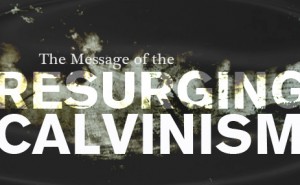I had the privilege of guest lecturing today at a University of Texas in a Journalism & Religion class. Eileen Delao-Flynn, Professor and Religion writer for the Austin-American Statesman, was kind enough to extend me the invitation. Thanks Eileen! The topic was the Resurgence of Mission & Reformed Theology.
The “New Calvinism”
The first half of the lecture was historical and focused on the Resurgence of Domestic Mission. The second half of the lecture was contemporary and focused on the Resurgence of Reformed Theology. Regarding the latter, TIME magazine noted “New Calvinism” as one of the top ten ideas changing the world in 2009. In an effort to explain this “New Calvinism”, I pointed out that New Calvinists are laboring to shake off fundamentalist, religious baggage and articulate an old gospel in fresh, biblically faithful ways. To this end, they are making five important distinctions:
-
- Gospel/Religion: New Calvinists point out that the Gospel is not Religion. This came as a surprise to some of the students. Religion says: “You must impress God†but the gospel says “Jesus impressed God for you.†Religion says perfect yourself and God will be happy. The Gospel says, “We are all imperfect people, but cling to a perfect Christ and gain a happy God.”
- Us/Them: The Gospel makes a distinction between arrogant separatism and humble evangelism. It doesn’t exaggerate an Us/Them mentality. New Calvinism doesn’t evangelize out of superiority but empathy. We recognize that we all need Jesus before the judgment of a holy God. The only difference between true Christians and non-Christians is that Christians are recipients of God’s grace in Christ. But we all are equally in need of that grace. There’s not one person in this world that needs God’s saving grace more than anyone else.
- Big/Small: New Calvinism is recovering a gospel that is bigger than “fire insurance” from hell. It is articulating the gospel as “good news†for the whole world, society, culture, people, the environment. The gospel is not a LCD, a lowest common denominator of the bare minimum facts you have to believe to get into heaven. Rather, it is a TOE, a theory of everything that addresses God’s purpose for humanity, society, culture, cities, environment, justice, and the future. New Calvinists are embracing all goodness, truth, and beauty as God’s truth, goodness, and beauty, and redemptively engaging that which is false, evil, and ugly.
- Conservative/Liberal: New Calvinists are distancing the gospel from Politics. We’re not preaching a political gospel, though the gospel does have political implications. In short, Jesus is not a Republican or a Democrat.
- Urban/Suburban: New Calvinists are returning to the city, to engage the beauty and brokenness of urban life. They are recovering a commitment to justice and mercy in the city, returning to cities from the white suburban flight.
These distinctions are direct result of a high view of the sovereignty of God–his reign over all of life not just religious matters. They flow from a big gospel that can be articulated as: the good news that Jesus has defeated sin, death, and evil through his own death and resurrection and is making all things new for those who hope in him. The dying-rising-from-the-dead Messiah alone has the power to break the back of evil, redeem sin, and exchange life for death. It is the gospel that awakens us to this marvelous news.
Continuity from the Old to the New Calvinism
Much more could be said regarding this resurgence, about these points and in addition to them. One student asked what remains the same between the “Old Calvinism” and “New Calvinism”. The soteriological core–God’s sovereign grace in redeeming broken sinners, via the total depravity, unconditional election, limited atonement, irresistible grace, and perseverance of the saints of TULIP acronym (limited atonement appears to be more negotiable among New Calvinists).
However, the TULIP is flowering more vibrantly than it has for some time in the U.S. The Reformed resurgence has led to a missional resurgence that is set on holding the formerly “liberal” and “conservative” agendas together with the Gospel, promoting robust engagement of social, cultural, and spiritual spheres of life. In this regard, the New Calvinism has more in common with Kuyperian Calvinism than some of its narrower conceptions. All in all, I believe this resurgence is a very positive resurgence, a winsome Calvinism for the 21st century that advocates a whole gospel for the whole person and country.

